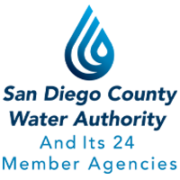May 22, 2023 – San Diego County Water Authority General Manager Sandra L. Kerl today issued the following statement regarding a new consensus-based plan to conserve water on the Colorado River:
“Today, the Lower Colorado River Basin states, California, Arizona, and Nevada, provided the U.S. Bureau of Reclamation with a plan to conserve up to 3 million acre-feet on the river through 2026 to address long-term drought and protect elevations in Lakes Mead and Powell, the two critical reservoirs the Lower Basin depends on for its river supplies.
“This consensus-based plan was offered to replace alternatives Reclamation is considering under its draft Supplemental Environmental Impact Statement (SEIS), released in April to consider changes to the river’s near-term operations. Those existing alternatives, one of which would bypass the Colorado River priority right system so important to California, would potentially mandate reductions to the Lower Basin.
“With the new proposal, Reclamation has announced it is temporarily suspending the SEIS process to allow more time to analyze the Lower Basin proposed plan. As a result, the May 30 deadline for comment letters on the draft SEIS is no longer in effect. As part of its announcement, Reclamation stated it plans to complete the SEIS process later this year.
“The Water Authority applauds the efforts of California, through the Colorado River Board of California, of which the Water Authority is a member, for working closely with the other Lower Basin states to develop a consensus proposal to submit to Reclamation. The Water Authority has been a long-time advocate of collaboration on the Colorado River, and today’s announcement appears to be a positive step in that direction.
“The Water Authority continues to review this proposal, which relies upon voluntary and federally compensated conservation as opposed to mandatory reductions, to make sure it best serves California, protects our region’s Colorado River supplies, and provides equitable, realistic solutions in the near term that will keep the river flowing for all users. If that end is achieved, we can then focus our attention on planning for the river’s long-term operations in a balanced Basin-wide approach.”
(Editor’s Note: Attached are two letters, including the Lower Basin proposal to Reclamation, and a letter from all seven Basin states calling on Reclamation to pause the SEIS process to review the Lower Basin proposed plan. To see the federal response, click the following link – www.doi.gov/pressreleases/biden-harris-administration-announces-historic-consensus-system-conservation-proposal)




